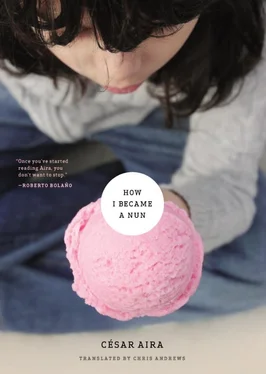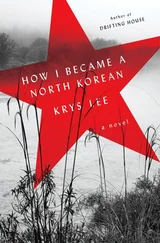The curtain went up for me one day, in the boy’s bathroom at school … But first I need to explain the circumstances, otherwise the anecdote will be incomprehensible.
We lived on the outskirts of Rosario, in a modest neighborhood, and most of the children at the local school came from humble families, often living just above the poverty line, or below it. At the time, children from what would now be called “marginal” families all went to school, at least for a few years. There were no special schools or educational psychologists … It was a very rough, very wild environment, a Darwinian struggle for life. The fights were bloody, and the vocabulary that accompanied them was brutal. I knew about swear words; I even knew the words themselves, but for some reason I had never paid them much attention. It was as if I registered them with a second sense of hearing and transferred them to another level of perception. I had come to the conclusion that they functioned as a set and their meaning was a kind of action, which wasn’t too far from the truth. There was only one element that stood out from the set. Usually, when the boys at school were arguing, the transition from verbal to physical abuse was signaled by one of them suddenly saying, in the midst of what was, for me, a nebulous mass of swear words, “He insulted my mother.”
I didn’t find this detail bewildering in itself, because the mother figure was sacred for me too, and I had noticed that “mother” was often included in the flow of swear words. Had I been asked, I think I could have even repeated the whole sentence, having heard it so often: “Your mother’s a bitch.” Now, except for that central word, the rest was meaningless noise to me. I was almost unimaginably vague, not because I was stupid, but because nothing really mattered to me. This is an enormous paradox, because everything mattered to me, far too much; I made a mountain out of every molehill, and that was my main problem … I might have seemed indifferent, but nothing could have been further from the truth and I knew it. This incident was a case in point. I must have noticed that sometimes a kid would say “He insulted my mother” without the word “mother” having been pronounced, but I let it pass, and thinking back over the whole incident, I concluded, for my own convenience, that “mother” must have been said, I must have missed it. On one occasion, however, I was forced to abandon this explanation. There was a fight at playtime, near the windmill at the back of the schoolyard. Whenever there was a fight, everyone went to see, gathering round in a circle two or three deep; there was no way it could go unnoticed. Then one of the teachers would come to break up the feral boxing match. But plunging into those mêlées was not for the faint-hearted, and only a small group of “tough” teachers dared to intervene, one especially, a strapping young lady, and she was the one who came this time. The contenders were two boys from the third grade, covered in blood, their smocks torn, both of them in a mad frenzy. The teacher pried them apart, not without difficulty. The bigger of the two went back to his gang of friends. The other one began to bawl. He was hiccoughing through his tears … one of my specialties. The teacher demanded an explanation at the top of her voice but he couldn’t speak. It was as if the fight was still going on in his heart. He looked so wretched, the teacher took him in her arms and hugged him tight. She guessed the explanation, which he finally managed to utter between violent sobs, “He insulted my mother.” She calmed him, hugged him … As a tough teacher she could understand; they lived in the same world, after all. The other boy was watching from a distance, surrounded by his friends, fury and resentment flaring in his eyes … Meanwhile, for the first time, I felt a note of boundless bewilderment resonating: Mother? What mother? What was he talking about? Why did everyone seem to accept what he said?
I had witnessed the brawl from the very start, I was certain I hadn’t missed anything and I knew that at no point had the word “mother” been pronounced. The other words, yes, but not that one. It was so clear, I could only conclude that “mother” must have been implied somehow. And of all the things I might have fastened on, that was what intrigued me most of all; I couldn’t get it out of my head.
Anyway, one day, in the middle of a lesson, I asked the teacher for permission to go to the bathroom. I was always doing this; we all were. I asked without needing to go or having carefully chosen my moment (I guess it was the same for the others). I did it on impulse. It’s the only unalloyed triumph I can remember from my childhood. As soon as the teacher saw the little hand go up, she would briefly consider what the pupil was going to miss (it was always something trivial like when to write b and when to write v) and then shout: All right! But this is the last time! The last time! And the kid who had been visited by the brilliant idea of asking at precisely that moment, which had turned out to be the last, ran out of the classroom, deliriously happy, under the hateful, bitter gaze of all the others, who felt they had missed their last chance … But the chance was repeated, identically, and seized, four or five times in every one-hour period. For us it was always now or never and the teacher always repeated her ultimatum, although she never said no, because the first-grade teachers, who were immune to other kinds of anxiety, lived in fear of the kids wetting themselves. But we didn’t know that. We were just kids. The amazing thing is that I managed to join in the game. It would have been much more like me to hold on until my bladder burst. But no. I asked without needing to go, like all the others. I wasn’t backward in that respect, at least.
My anomalous behavior can perhaps be explained by a magically repeated coincidence. Every time I asked for permission to go to the bathroom, two or three times a day and always on the spur of the moment, as I was crossing the deserted yard, I met a boy heading in the same direction, a boy from another grade, I don’t know which. We ended up becoming friends. His name was Farías. Or was it Quiroga? Now that I’m trying to remember, I’m getting the names mixed up. Or maybe there were two of them.
This time, he was there, as usual, although we had never dreamed of arranging to meet. The dark grey walls of the bathroom were covered with graffiti. The kids were always stealing chalk so they could write on them. I had never really paid much attention to the inscriptions.
Farías pointed one out to me; it was large and recent. After a few days of exposure to the powerful ammoniac fumes of the bathroom the chalk began to darken. These letters were so white they shone — so they must have been fresh that day. They were capital letters, fiercely legible, though not for me; all I could see were horizontal and vertical sticks in a senseless tangle. Until that moment I had thought that the graffiti in the bathroom were drawings, incomprehensible drawings, runes or hieroglyphs. Farías waited for me to “read” the inscription, then he laughed. I laughed with him, in all sincerity. What a funny drawing! I really did find it amusing. What an idea! I thought. Incomprehensible drawings! But something prevented me from expressing this thought; my hypocrisy had recesses that were obscure even to me. Farías, however, spoke his mind; he made some smug and insinuating remark … I can’t remember what. It was something about a mother. That was all it took, unfortunately. I understood, and it felt as if the world was crashing down on me.
I understood what it meant to read. Mothers were mixed up with that too! What I had mistaken for drawings, or some kind of recondite algebra in which the teachers specialized for reasons that were none of my concern, turned out to mean the things that people said, things that could be said anywhere, by anyone, even me. I thought it was just school stuff, but it was the stuff of life itself. Words, silent words, mimicry, the process by which words signified themselves … I understood that I didn’t know how to read, and the others did. That’s what it had all been about, all that I had suffered in ignorance. In an instant I grasped the enormity of the disaster. Not that I was particularly intelligent or lucid; the understanding happened in me, but I had almost no part in it, and that was the most horrible thing. I stood there transfixed, staring at the inscription, as if it had hypnotized me. I don’t know what I thought or decided to do … maybe nothing. The next thing I remember is sitting at my desk, where I vegetated day after day. I opened my virgin exercise book, picked up my pencil, which I still hadn’t used, and reproduced that inscription from memory, stroke by stroke, without a single error or any idea what I was writing:
Читать дальше












